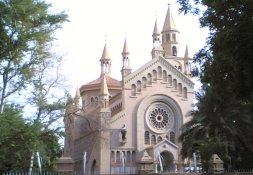Troubles persist for Christians despite Sudan’s peace deal
Oct 4, 2005 (JOBORONA, Khartoum state ) — “Forty-five lashes for being drunk,” the man said bitterly, raising his shirt to show crisscrossed wounds on his stomach, some still red and tender.
 Marko Mayoren, 50, had been released a day earlier after a night
Marko Mayoren, 50, had been released a day earlier after a night
in jail and a brief trial that convicted him of breaking Islamic
law by drinking alcohol.
Having just ended a 21-year civil war that divided Muslims and
Christians, Sudan has a new government, new interim constitution
guaranteeing religious freedom. But for Mayoren, the new deal so
far exists largely on paper.
At the same time, others report fewer acts of harassment since
the new constitution took effect in July, such as less stringent
application of the rules on alcohol and women’s dress.
But it’s still not easy for the tiny Christian minority in this
capital of 3 million people.
Mayoren said he was taken to a verandah of the Muslim Court of
Conduct and lashed front and back with a leather whip, then ordered
to pay a 5,000 dinar fine (about $20) — “Plus 50 dinars (20 cents)
for the ink they used to write the report,” he said angrily.
Mayoren’s comrades swapped nearly identical stories as they sat
on low stools and dipped a wooden bowl into a bucket of a fermented
orange drink called, for reasons unknown, “Internet.”
These refugees are from the war-ravaged south, where
Christianity and traditional African faiths are the main religions.
Now 400 to 800 miles from home, they sat at an improvised outdoor
bar in Joborona, one of several camps for some 2 million
southerners that have sprung up around Khartoum over the past two
decades.
The men know the law forbids alcohol; they just don’t think it
should apply to Christians.
They’re right, says Ghazi Suleiman, a Muslim lawyer and
SPLM parliament member. He notes that the constitution says “Sudan is a
diversified nation” and guarantees respect for all practices,
traditions and religions.
But the capital is still an Islamic city, where most women wrap
head and body in flowing robes, all shops and the one Western-style
mall close for Friday prayers, and a huge sign in English on the airport highway offers this verse from the Quran, the Muslim holy book: “If anyone desires a religion other than Islam, never will it be accepted of him.”
At a five-star hotel, foreign men and women can mingle by the pool, but not Sudanese women; they have to use a small women-only pool indoors.
The new constitution has given Christians a slight sense of
reprieve. Arrests such as Mayoren’s seem to have decreased, and some say police have stopped boarding buses to sniff southerners for alcohol.
Christian women have been quick to discard scarves and
long-sleeved garb, though they still report women being roughed up when alone and cornered by a cop.
Law enforcement agencies have been officially ordered not to harass non-Muslims and not to detain drinkers unless they are disturbing the peace.
Jacqueline Khamis, a 23-year-old Christian who lives in Joborona camp, has short, uncovered hair, wears a T-shirt and long skirt. She says “there’s been a great change” since the government and southern rebels signed a peace deal in January that made rebel
leader John Garang de Mabior first vice president — the only Christian ever to hold the post.
Until peace was signed, “almost every girl I know has been
physically harassed for the way she is dressed,” Khamis said.
Compliance with the new rules seems sketchy, though. In August, police raided a house party and sent the expatriates and U.N.-employed Sudanese home but checked the others for boozy breath, revealing clothes and suggestive photos in their cell phones. Suspected offenders were detained.
Suleiman said such incidents decreased considerably after the
constitution was signed, but old habits of harassment returned
following the death of rebel chief Garang in a plane crash in July,
just three weeks after he was sworn in.
“We had a setback, but we will rectify things,” Suleiman said.
“These actions will definitely come to an end soon.”
The Khartoum provincial government will set up a committee to
enforce Christian rights in the capital, he said, and the city
“shall be under two systems of law so we can prevent these
abuses.”
Khamis, however, is less optimistic about her future under the Arabs, as Muslim northerners are known.
“I don’t think we’ll be able to live openly as Christians for a long time,” she said. “Even if the Arabs say, ‘feel free,’ they’ll catch you in a corner and do what they want to you.”
(AP/ST)
